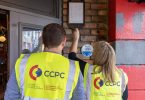75% of UK food waste avoidable
The research from the UK charitable status organisation Waste Resources & Action Plan, also found that the total amount of waste including food, packaging and other ‘non-food’ waste produced each year at HaFS outlets is 2.87 million tonnes of which 46% is recycled, sent to anaerobic digestion or composted.
Some 920,000 tonnes of food is wasted at outlets each year, 75% of which is avoidable and which could have been eaten.
40% of wasted food comprises carbohydrates including potato, bread, pasta and rice. Reducing wastage in carbohydrates would have a significant impact on the total amount of food being wasted each year in the UK which equates to 1.3 billion meals or one in six of the eight billion meals served each year.
On average 21% of food waste arises from spoilage; 45% from food preparation and 34% from consumer plates. 12% of all food waste is recycled while 1.3 million tonnes of packaging and 0.66 million tonnes of other ‘non-food’ wastes are discarded; that includes items such as disposable kitchen paper and newspapers.
Thus 62% of packaging and other ‘non-food’ waste is recycled but the highest level of recycling is for glass and cardboard. 56% of packaging and other ‘non-food’ waste that’s thrown away could have been readily recycled.
In addition to this a further 130,000 tonnes of food waste is generated from the preparation of ready-to-serve food items and meals for the HaFS sector at food manufacturing sites.
In order to reduce such waste, the Hospitality and Food Service Agreement has been drawn up between WRAP and hospitality organisations, a voluntary agreement to support the sector in reducing waste and recycle more.
The Agreement is flexible to allow any size of organisation to sign up. WRAP has also worked closely with interested and relevant organisations and individuals to determine the targets for the Agreement.
These are:
- Prevention target: Reduce food and associated packaging waste arising by 5% by the end of 2015. This will be set against a 2012 baseline and be measured by CO2e (Carbon Dioxide equivalent) emissions.
- Waste management target: Increase the overall rate of food and packaging waste being recycled, sent to anaerobic digestion or composted to at least 70% by the end of 2015.
The benefits of signing up to the plan include:
- more efficient use of resources
- meeting clients’ and consumers’ growing expectations to reduce food waste
- cost savings for clients and businesses
- reducing the carbon footprint associated with products and operations
- driving innovation in the sector with support from all UK Governments and
- consistency with Government policy and regulation.








